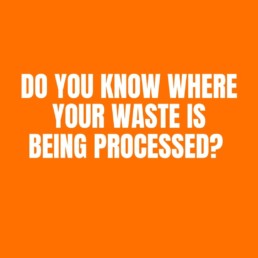Responding to the needs of our customers
We recently had a conversation with one of our customers and gained valuable insights about the benefits of working with Footprint Recycling. It was such an inspiring story we shared it across our channels and we received a comment about the importance of reviewing where the waste was being processed and ensuring it was being processed effectively. This is absolutely right.
All businesses need to consider where their waste is processed as part of their waste journey as when it comes to reducing waste and promoting sustainability, businesses have a significant role to play.
At Footprint, we believe that a comprehensive waste journey analysis is the first step towards achieving this goal. We work closely with our customers to assess their waste production and identify areas where they can reduce, recycle, reuse, and repurpose waste.
We then assist them in implementing these changes while ensuring that they comply with all legal requirements. We understand that monitoring and reporting are critical components of any waste management process. That's why we provide our customers with regular updates on their waste journey process, including data on waste generation, recycling rates, disposal methods and outcomes. This information helps them to evaluate their progress and identify areas for further improvement.
We believe that a zero-waste approach is the way forward, and we encourage our customers to adopt this mindset. By eliminating waste from their production processes and finding innovative ways to repurpose and reuse materials, businesses can significantly reduce their environmental impact while saving money.
In conclusion, our comprehensive waste reduction process is designed to guide businesses towards sustainability and zero-waste practices. We believe that by working together, we can make a real difference and build a better future for generations to come.
New Service Offer 2022 – Start your journey to net-zero emissions
Start your journey to net-zero emissions
2022, and we are all under pressure to reduce our carbon emissions. While it’s been at the forefront of our minds over the years, it is now reaching an emergency state with worldwide leaders and climate change organisations working together and applying pressure to governments, countries, and companies to act. But where do you start?
Over the past 15 years, we’ve been on a journey to help businesses dispose of, reduce, and recycle their waste and increase sustainability. As part of this journey, we are now offering a new service that provides a path to help you identify, plan and reduce your carbon emissions. Our process is simple:
- Consultation and planning – help you understand and plan
- Measure your carbon emissions – collect the data and identify
- Reduce your carbon emissions – ways to reduce your carbon emissions
- Compensate your carbon emissions – offset your business footprint.
Helping you calculate your climate footprint including scope 3 supply chain emissions
Carbon emissions are identified under three scopes, it’s a way to categorise the different kinds of carbon emissions you create. An estimation of your carbon emissions under each scope will result in a “carbon footprint”. Therefore, a phased approach to identifying the company’s carbon emissions under each scope is recommended, with a short-term carbon-neutral goal, and a longer-term net zero carbon goal (based on delivery of a carbon reduction plan).
Establishing a baseline for your Scope 1 and 2 carbon emissions will enable the business to understand the carbon impact associated with its energy use.
Scope 1 covers the Green House Gas emissions that a company directly makes — for example, running its boilers and vehicles.
Scope 2 are the emissions it makes indirectly – like when the electricity or energy it buys for heating and cooling buildings is being produced on its behalf.
Scope 3 is a little more complicated as it covers all the emissions associated with your business, even those you are indirectly responsible for. For example, buying from suppliers and its products when customers use them.
We work with a range of carbon standards, including the Greenhouse Gas Protocol; PAS 2060 for carbon-neutral organisations; PAS 2050 for carbon neutral products; Streamlined Energy and Carbon Reporting; ISO 14064-1 for greenhouse gas inventories; ISO 14064-3 for verification of greenhouse gases; and a range of sector-specific guidelines as appropriate. Your carbon ambitions (e.g. carbon neutrality), and what is important to your stakeholders will determine which Standard is most appropriate to work with for you.
If you’d like to start your carbon-neutral journey get in touch clare@footprint-recycling.com


